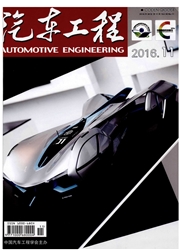

 中文摘要:
中文摘要:
以一台增压中冷压燃式发动机为试验样机,在其第1缸进行甲醇混合气自燃试验,分析甲醇自燃的压力振荡特性,研究超级爆震中破坏性压力波形成的规律。研究结果表明:随着过量空气系数的减小,甲醇自燃的概率有上升的趋势;而在同一过量空气系数下,上止点前着火的循环最高燃烧压力和压力振荡幅度远大于上止点后着火的循环,振荡频率也较高,并且随着着火时刻靠近上止点,最高燃烧压力和压力振荡的幅度与频率均增大;自燃时刻位于上止点前附近时,压力振荡的破坏性最大;甲醇自燃与超级爆震类似,具有间歇性。
 英文摘要:
英文摘要:
A methanol mixture auto-ignition test is conducted on the first cylinder of a turbocharged intercooled diesel engine to analyze the pressure oscillation characteristics of methanol auto-ignition and study the forming law of destructive pressure wave in super knock. The results show that the probability of methanol auto-ignition tends to increase with the decrease of excessive air coefficient. At a same excessive air coefficient, when auto-ignition happens before TDC, both the peak pressure and the amplitude of pressure oscillation are far greater than those when it happens after TDC, with its oscillation frequency also higher. The closer to TDC the auto-ignition moment, the greater the peak pressure and the amplitude and frequency of pressure oscillation, with the greatest destruction of pressure oscillation occurs when auto-ignition happens at near but before TDC. Finally it is also found that methanol auto-ignition happens intermittently, similar to super knock.
 同期刊论文项目
同期刊论文项目
 同项目期刊论文
同项目期刊论文
 Experimental investigation on regulated and unregulated emissions of a diesel/methanol compound comb
Experimental investigation on regulated and unregulated emissions of a diesel/methanol compound comb Experimental and Computational Studies on Ignition Characteristics of Diesel in a Premixed Ethanol-A
Experimental and Computational Studies on Ignition Characteristics of Diesel in a Premixed Ethanol-A Simulations of diesel-methanol dual-fuel engine combustion with large eddy simulation and Reynolds-a
Simulations of diesel-methanol dual-fuel engine combustion with large eddy simulation and Reynolds-a Experimental and modelling studies of the effects of methanol and ethanol addition on the laminar pr
Experimental and modelling studies of the effects of methanol and ethanol addition on the laminar pr Experimental and modeling study of the effect of ethanol and MTBE on the oxidation of PRF90 in low p
Experimental and modeling study of the effect of ethanol and MTBE on the oxidation of PRF90 in low p 期刊信息
期刊信息
